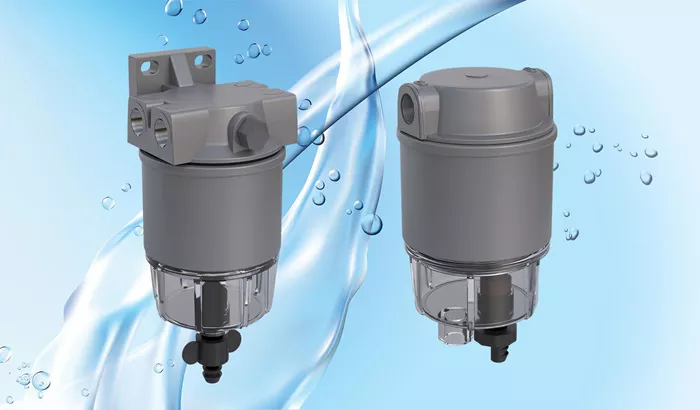Fuel water separators play a crucial role in the proper functioning of diesel engines. Water contamination in fuel can cause significant damage to engine components, reduce efficiency, and lead to costly repairs. Fuel water separators help prevent these issues by filtering out water and contaminants from fuel before it reaches the engine. In this article, we will explore the function, types, working mechanisms, benefits, and maintenance of fuel water separators.
Why is Water in Fuel a Problem?
Water contamination in fuel can occur due to condensation, poor storage practices, or contaminated fuel supply. Diesel fuel is particularly susceptible to water contamination because it absorbs moisture from the air. Some major problems caused by water in fuel include:
- Corrosion: Water can lead to rust formation in fuel lines and injectors, reducing their lifespan.
- Microbial Growth: Water in fuel can encourage the growth of bacteria and fungi, leading to clogged filters and injectors.
- Reduced Combustion Efficiency: Water in fuel reduces energy output, leading to lower engine performance and increased emissions.
- Component Damage: Water can cause injector damage, resulting in improper fuel atomization and engine misfires.
How Does a Fuel Water Separator Work?
A fuel water separator functions by using different filtration stages to remove water and contaminants from the fuel. The working mechanism includes the following steps:
- Separation Stage: The separator uses gravity and centrifugal force to separate water and heavy particulates from the fuel.
- Coalescing Stage: Water droplets combine into larger droplets that are easier to remove.
- Filtration Stage: A fine filter element captures smaller particles and residual water, ensuring clean fuel reaches the engine.
- Drainage Stage: Separated water is collected in a sump or bowl, which can be manually or automatically drained.
Types of Fuel Water Separators
Spin-on Fuel Water Separators
Spin-on fuel water separators are compact, easy to replace, and widely used in marine, automotive, and heavy-duty applications. They consist of a filtration element housed in a replaceable canister. These separators are known for their convenience and reliability.
Bowl-Type Fuel Water Separators
Bowl-type separators are equipped with a transparent bowl that allows users to monitor water accumulation. They often include a manual or automatic drain valve for easy water removal. These are commonly used in marine and industrial applications.
Centrifugal Fuel Water Separators
Centrifugal separators use rotational force to separate water and heavier contaminants from the fuel. They are highly efficient and commonly found in high-performance applications, including aviation and industrial engines.
Magnetic Fuel Water Separators
Some fuel water separators integrate magnetic components to attract metal particles in addition to separating water. These are useful in applications where metal contamination is a concern, such as construction and heavy machinery.
Benefits of Using a Fuel Water Separator
Increased Engine Longevity
By preventing water-related damage, fuel water separators help extend the life of critical engine components, such as injectors, fuel pumps, and cylinders.
Improved Fuel Efficiency
Clean fuel combustion leads to better fuel efficiency, reducing overall fuel consumption and operational costs.
Reduced Maintenance Costs
Preventing water contamination minimizes the need for frequent fuel system repairs and replacements, saving money in the long run.
Better Engine Performance
Engines run smoother and more efficiently when they receive clean, water-free fuel, leading to better throttle response and reduced emissions.
Common Applications of Fuel Water Separators
Marine Engines
Boats and ships often operate in humid and wet environments, making fuel water separators essential for preventing water contamination in fuel systems.
Diesel Trucks and Heavy Equipment
Diesel-powered trucks, tractors, and construction equipment rely on fuel water separators to maintain consistent performance and reduce downtime caused by fuel contamination.
Industrial Machinery
Power generators, compressors, and other industrial diesel equipment benefit from fuel water separators to ensure reliable operation and prevent damage from water-laden fuel.
Aviation Industry
Aircraft using aviation fuel require highly efficient fuel water separators to ensure safe and optimal engine performance.
Maintenance and Troubleshooting
Regular Inspection and Drainage
Checking and draining accumulated water from the separator is essential to maintaining its efficiency. Many separators have a manual drain valve, while others feature an automatic drainage system.
Filter Replacement
Filters should be replaced according to manufacturer recommendations to ensure proper filtration and prevent clogging.
Monitor Fuel Quality
Using high-quality fuel and proper storage practices can reduce the risk of water contamination and extend the life of the fuel water separator.
Signs of a Failing Fuel Water Separator
- Reduced Engine Power: Contaminated fuel can affect combustion, leading to performance issues.
- Rough Idling or Stalling: Water in the fuel can cause misfires, rough idling, or engine stalls.
- Increased Exhaust Smoke: Poor fuel combustion due to water contamination may produce excessive smoke.
- Frequent Clogging of Filters: If the separator is frequently clogged, it may indicate excessive water or debris in the fuel supply.
Conclusion
Fuel water separators are essential components for maintaining engine health and performance. By effectively removing water and contaminants from fuel, they prevent corrosion, microbial growth, and engine damage. Regular maintenance, proper filter replacement, and using high-quality fuel can further enhance their efficiency. Whether in marine, automotive, industrial, or aviation applications, fuel water separators play a crucial role in ensuring reliable and long-lasting engine operation.

